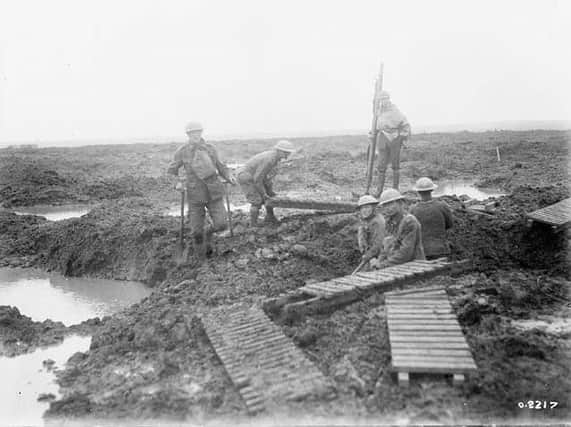"Rugby's new terraced streets were to become streets of sorrow" - how our town fought through the First World War


Now, as we prepare to mark 100 years since the Armistice, we have compiled some of the extensive and thoroughly-researched work that Mr Stanley previously shared with the Advertiser.
Mr Stanley wrote: Rugby had expanded greatly around 1900, with an urban population of 26,000 by 1914 and another 16,000 in the villages of the Rugby district.
Advertisement
Hide AdAdvertisement
Hide Ad“Major employers included the electrical engineering works of BTH (British Thomson Houston) on Mill Road, the LNWR railway workshops, and the Willans works on Newbold Road, making turbines for generating electricity.
“Employment led to new terraced housing in New Bilton, and in the large central area of Rugby bounded by Newbold Road, Clifton Road and the railway.
“Rugby was a major railway junction, and during the war, troop trains became a common sight, as thousands of soldiers passed through the town on their way south.
“Cars, buses and motor-bikes could be seen alongside horses on roads now lit by electric light, but Rugby’s new terraced streets were to become streets of sorrow in 1915, as war casualties mounted, along with the number of grieving mothers and widows in black.
Advertisement
Hide AdAdvertisement
Hide Ad“On the Western Front, 1915 was dominated by trench warfare, especially by British attempts to break through German lines in the second Battle of Ypres. Rugby School boy Louis Stokes, now 18 and in the army, wrote home in June about the coming attack, that ‘We are immensely superior to the Germans in ammunition’, but ‘If it does not quite succeed, it will have been a ghastly waste of money, men and munitions.’
“His fears were soon realised. The BEF (British Expeditionary Force) was led by Sir John French, who launched various offensives involving Rugby troops, especially at Loos (the ‘Big Push’) in September.
“These battles brought heavy losses but only minor gains of territory. Over 80 men from the Rugby area were killed in trench warfare and battles on the Western Front during 1915.
“The pages of the Rugby Advertiser conveyed news from the ‘home front’ and from the frontline, with lists of local men recently killed, wounded, missing or taken prisoner.
Advertisement
Hide AdAdvertisement
Hide Ad“By Christmas 1915, over 200 Rugby men had died in the war, and the optimism of August 1914 was a distant memory.
“3,200 Rugby men had now volunteered for the forces, but recruitment rates in Rugby and elsewhere were too low to replace losses, and in January 1916, conscription started in Britain for most single men aged 18 to 41.
“Later that year, married men were called up, and in 1918 the upper age limit was raised to 51.
“Not all men wished to fight. A ‘No Conscription Fellowship’ was formed in Rugby in 1915, and a public meeting against conscription was attended by over 700 married men in March 1916, at The Empire cinema (now Rugby Theatre).
Advertisement
Hide AdAdvertisement
Hide Ad“Opponents of conscription could appeal to a local tribunal to decide their case, and from 1916-1918 hundreds of appeals by local men were reported in the Rugby Advertiser.
“As Allied forces advanced into Germany, Rugby’s losses continued right up to the ceasefire on 11th November.
“J H Vale of Clifton, who won the DCM and MSM medals, fell in September.
“Losses in October included 2nd Lt Harold Lever of Hillmorton, Pte A E Webb of Alexandra Road who had been in France for just over a fortnight, and Pte H J Oldham of Newbold, followed by Pte George Brain from Dunchurch at the start of November.
“D R Coleman of Rugby, a Royal Engineers pioneer, joined the ranks of war dead on the very day of the Armistice, 11 th November 1918. The guns fell silent at 11am."